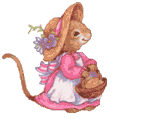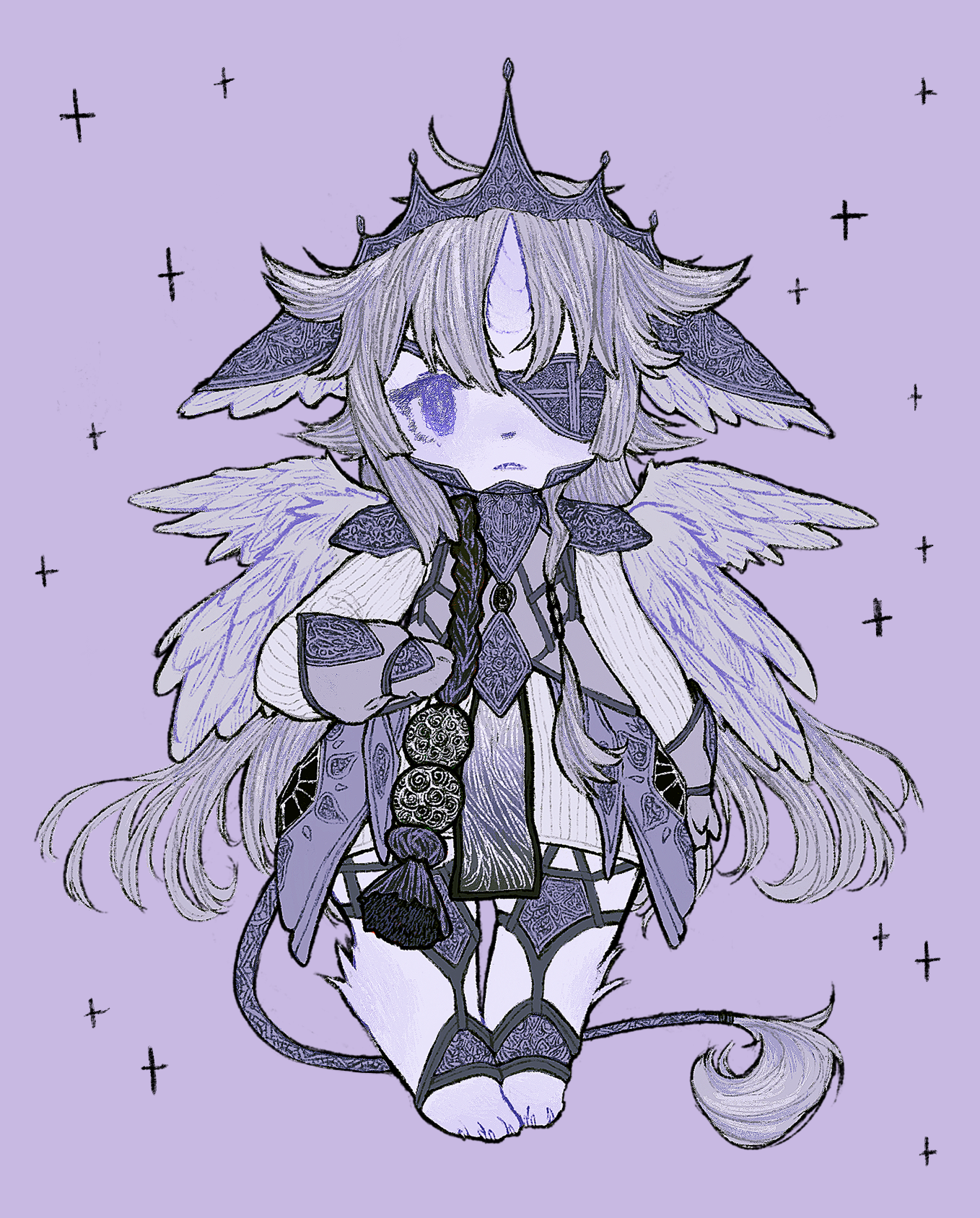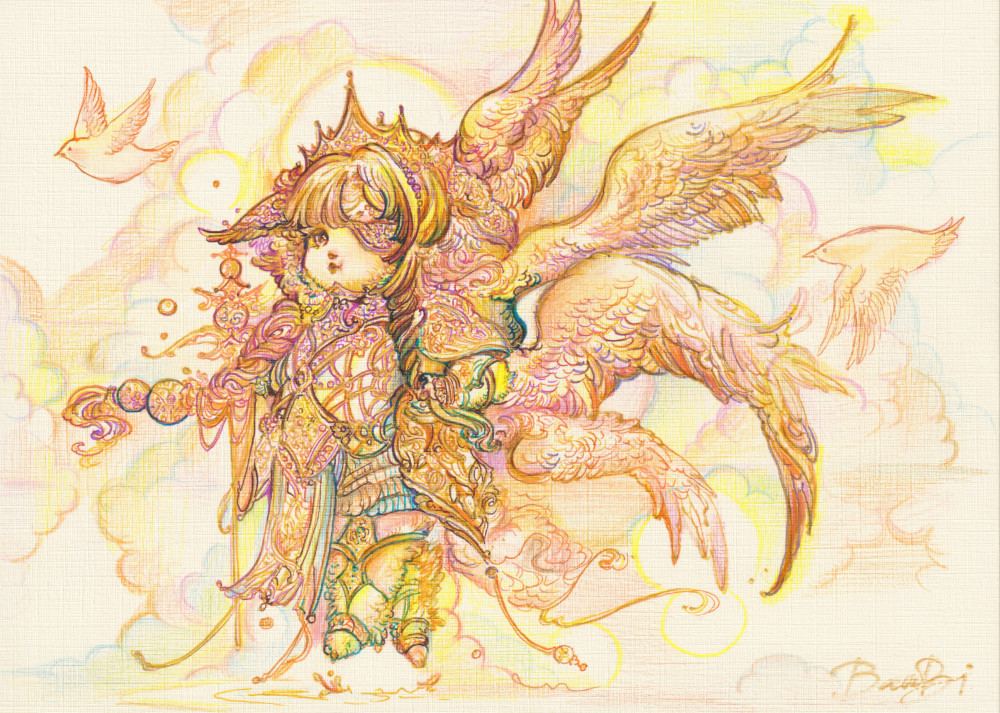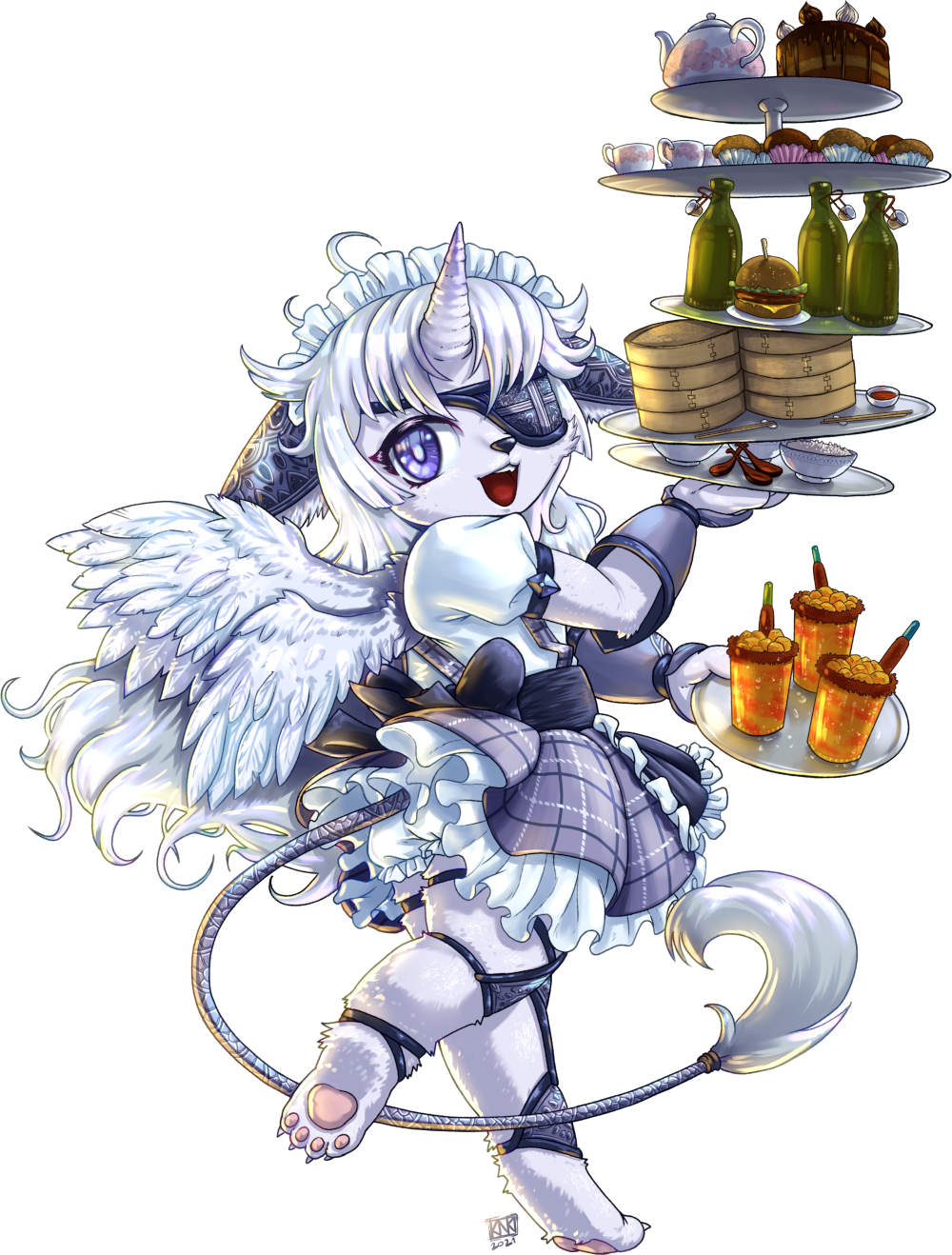
Lavender
dungeons & dragons
Lavender has spent her entire life searching for home. She was ostracized from birth—a Firbolg touched too deeply by the Fey was considered a grave omen among her people. She was born with a myriad of oddities: empty left eye socket, feathery ears, lavender fur, spiraling horn, and whip-like tail, as well as a much smaller physique than any other Firbolg child. The Firbolg of the village exiled her parents, believing that they must have made a selfish deal with the Fey in order to result in their first child being born as such a strange monstrosity. While the Firbolgs were an accepting people, Fey magic was never to be trifled with.
Her parents never revealed to Lavender whether or not they actually made a deal with the Fey, nor what the deal could’ve been. They were simple people, tending to their gardens with gentle ease.  Lavender loved them, and they didn’t seem to resent her. However, mentions of their past lives in the village would make them weep, so Lavender evaded the topic. Her parents taught her that she was a Firbolg—they seemed intent on claiming that she was, even when Lavender found herself unable to speak to animals and plants as they did. Any mention of her inability to act as a normal Firbolg resulted in her parents insisting that she was a “late bloomer”. Lavender knew from a young age that she wasn’t the same species as her parents, but she didn’t question them.
Lavender loved them, and they didn’t seem to resent her. However, mentions of their past lives in the village would make them weep, so Lavender evaded the topic. Her parents taught her that she was a Firbolg—they seemed intent on claiming that she was, even when Lavender found herself unable to speak to animals and plants as they did. Any mention of her inability to act as a normal Firbolg resulted in her parents insisting that she was a “late bloomer”. Lavender knew from a young age that she wasn’t the same species as her parents, but she didn’t question them.
Around her fifteenth birthday, her parents decided that it was time for Lavender to live on her own. They told her that they could move back into the village without her presence looming over them; while they loved Lavender, they loved their home even more. Lavender was distraught by this, and she begged her parents to let her come with—or at the very least come visit—but they pushed her away. “Someday, you’ll find your home,” they said. “And then you’ll understand why we have to make this sacrifice.”
Despite her pain, Lavender accepted their choice. She tried to live by herself in the Gentlebud Forest as her parents had taught her—but, lacking the natural abilities of a Firbolg, she found it difficult. Hungry and lonely, she decided to head into the nearby city of Brane, though she was just as othered there due to her strange, feyish appearance.

However, in addition to her odd looks, Lavender was born with another quality of utmost rarity among mortal-kind: patience. Lavender was always willing to give people the benefit of the doubt, and if someone was cruel to her, she would never speak cruelly in return. She knows that she is an odd person, and she doesn’t blame people for thinking she’s strange. Perhaps she is Fey, perhaps she is cursed, perhaps she was simply born different—she is herself, and that is all that matters to her. Even so, hearing spiteful jeers all of her life has made her curious as to why people resent Fey so much—though her curiosity is tethered by her fear that she won’t like what she discovers about herself. She wants to believe that her character is not defined by the circumstances of her birth, but she knows all-too-well that magic and curses are real, tangible forces: learning that she is cursed to cause pain and that there is nothing she can do about it is her worst fear. Lavender believes with every fiber of her being that if something bad happens to her, it is her fault: she did not try hard enough, or she did not have the correct outlook. She always blames herself—it is never the fault of others. That which exists outside of her control or takes away her agency, such as the circumstances of her birth, terrifies her.
Lavender eventually found herself volunteering to help others in need—at orphanages, soup kitchens, charity drives, etc. As she was working, she became connected to the goddess Ophine—patron-saint of community and respite—as most charities in the city were religious.  Lavender resonated with the idea that home is not a place, but a mindset (as taught by Ophine): you should treat everywhere like your home and everyone like your family. It was during this time that she began to resent her parents; she failed to understand how they could have abandoned their child for the sake of a place, or even a people. In Lavender’s opinion, if a person makes you compromise your beliefs or act cruelly towards others, then they are not truly part of the capital-C Community and therefore not worthy of your respect or devotion. Even so, Lavender’s feelings of resentment were not those of revenge: rather, she wanted to speak with her parents and learn about their mindset to better understand them and sway them into a kinder point of view.
Lavender resonated with the idea that home is not a place, but a mindset (as taught by Ophine): you should treat everywhere like your home and everyone like your family. It was during this time that she began to resent her parents; she failed to understand how they could have abandoned their child for the sake of a place, or even a people. In Lavender’s opinion, if a person makes you compromise your beliefs or act cruelly towards others, then they are not truly part of the capital-C Community and therefore not worthy of your respect or devotion. Even so, Lavender’s feelings of resentment were not those of revenge: rather, she wanted to speak with her parents and learn about their mindset to better understand them and sway them into a kinder point of view.
Lavender served the goddess Ophine as a low-working volunteer for nearly sixty years. Most of her time was spent at Ophine’s Home for Wayward Youth, where she worked as a general caretaker of children, as well as a chef. She tried her best to provide for the children and bring a little sunshine into their lives. Many of the other caretakers at the orphanage had little pity for the children and were cruel for no real reason: Lavender was outwardly critical of these higher-ranking members of the church, and as such never earned the opportunity to climb up the ladder. She didn’t mind, though, and preferred the hands-on volunteer work of caring for those in need.
While Lavender was and is a sweet, kind-hearted person who changed many people’s lives for the better during her time in Brane, she had trouble making and keeping friends. She is overly saccharine, and her constant need to nurture and lecture  often scares people away. The only person who served as Lavender’s long-lasting friend was a human woman named Vera Barnette. She met Vera when Vera was about 35, and they’ve been friends for 40 years. Vera is a cleric of Ophine with a deeply spiritual connection to Her; not only that, but she is well-respected in both religious and political circles in Brane. Vera was the only person to not completely push Lavender away: she worked with her at church functions and frequently shared meals with her. Vera, from a part of Marra with a deep dependence on the spice trade, was the one who taught Lavender the wonders of spicy food. Vera is an equally kind soul, though she's getting up there in years—she is currently 75 years old.
often scares people away. The only person who served as Lavender’s long-lasting friend was a human woman named Vera Barnette. She met Vera when Vera was about 35, and they’ve been friends for 40 years. Vera is a cleric of Ophine with a deeply spiritual connection to Her; not only that, but she is well-respected in both religious and political circles in Brane. Vera was the only person to not completely push Lavender away: she worked with her at church functions and frequently shared meals with her. Vera, from a part of Marra with a deep dependence on the spice trade, was the one who taught Lavender the wonders of spicy food. Vera is an equally kind soul, though she's getting up there in years—she is currently 75 years old.
One night under the spell of sleep, a strange vision bewitched Lavender: she dreamed of a creature blackened by malice and hatred, terrorizing people in a wasteland of blood-stained snow. The dream was unlike any she had ever had before: it felt uncomfortably real. It was as if all of the creature’s hate was directed solely at her. Distressed by the dream, Lavender sought advice from Vera, who performed a ceremony to consult Ophine. She told Lavender that it was possible that Ophine had contacted her to serve as a holy warrior on Her behalf, and that she had shown her a vision of the evil she must defeat. Lavender wondered if that could be the case—it was such a distressing vision, it didn’t seem like it could be from Ophine. She also wondered if ultimate evil was truly ultimate: maybe it was not her duty to eradicate the evil, but to speak with it, reason with it, and redeem it. Maybe it wasn’t a beast at all, but a symbolic manifestation of the hatred plaguing the hearts of all men. Vera could give no further insights, but she suggested that Lavender ought to investigate the vision for herself.
With their combined effort, they determined that the place Lavender had seen in the vision was in the snowy plains near Port Sulma. Thus, Lavender sets off into the great wide somewhere, seeking to spread her love of community and respite, redeem any “family” who have fallen to evil, and discover what Ophine has planned for her.



Goals + Values
Hearth in our Hearts. The mantra of Ophine. Lavender must strive to create a better community, help people in need, and make people feel at home no matter where they are
Kindness Begets Kindness. If people experience kindness, they are more likely to be kind, thus fall in love with their community and resist the temptation of evil. Lavender believes those who have fallen victim to evil can be redeemed through kindness and non-violence
Not In My House. Anybody who has hurt her home needs to be eliminated. She will reason with people first and believes ultimately in redemption, but sometimes people need a good smack to get the point.
Under a Rock or Under a Stone. Despite her worship of home, Lavender does not have one “community” she identifies with. She doesn’t have anything that is fully “hers”—not even a hearth. She hopes that someday she will be able to find a family she can rely on and loves her for who she is, despite her bewitched blood
Mystery Orphan. She knows, deep inside, that she isn’t a Firbolg, and is curious as to the nature of her “adopted” parents and “actual” parents
Actually Yes, You Can Buy Happiness. Lavender does, ultimately, need money to donate to charity, specifically the orphanage she worked at/Orphine churches in general.


Personality
Lavender is very sweet. As someone who worships the “home” and “respite”, she values harmony and kindness. She will go out of her way to be nice and help people in need. Her kindness can be easily misinterpreted as naivety, but she actually has a miraculous insight—and even though she knows that people may be lying or using her for nefarious purposes, she will allow them to. She will present them with opportunities to become a better person, and she hopes that continually offering kindness will result in being offered kindness in return. She is incredibly tempting to bully, but she is unlikely to react to it.
Despite her generosity, Lavender can be a little awkward. She often inserts herself into conversations or private moments that may not concern her. In  addition, she has trouble understanding the nuances of cultural differences, as she has never had the experience of being a part of any one “culture”. She can be too quick to forgive, or finds herself forgiving atrocities that aren’t hers to forgive. She must always mediate, and she has too much faith in “humanity” to consider death or violence as options.
addition, she has trouble understanding the nuances of cultural differences, as she has never had the experience of being a part of any one “culture”. She can be too quick to forgive, or finds herself forgiving atrocities that aren’t hers to forgive. She must always mediate, and she has too much faith in “humanity” to consider death or violence as options.
She is always willing to learn and change, though. As she experiences more of the world and does battle, she has been forced to recognize that evil exists, and she will try her best to rid the world of those who seek to endanger it. Her niceness, naivety, and size makes her seem childish, but she is a rational adult (76 years old): she is simply optimistic to a fault.
Lavender loves cooking ludicrously spicy food, and she jams out to the medieval equivalent of death-metal music. She likes to read books (nothing is better than a good bedtime story) and often writes her own fiction, but she’s shy and doesn’t share her work. If she had a house, it would be decorated with “live, laugh, love” signs. She fights with a beautiful sword and shield that are far too large for her. She carries around a worn, stuffed sheep she sleeps with (Lamby), and she would like to learn how to sew someday.

